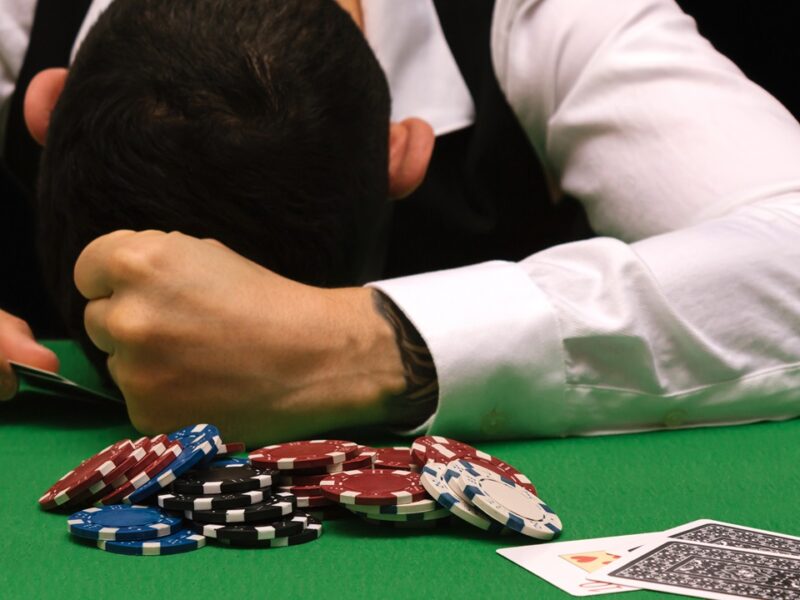Many people find gambling to be a fun, safe pastime. However, gambling may swiftly turn from a pleasant hobby into a life-consuming compulsive disorder for some people. It’s common to mistake the signs of a gambling problem as:
- The drive to play games
- A desire to win money
- Anything other than an uncontrollable compulsive behavior.
Although an affected individual may appear normal with a typical life, they constantly battle a temptation that is difficult to ignore. Recognizing compulsive gambling is the first step to overcoming it. So, what are the signs of a gambling problem to watch for?
7 Warning Signs of a Gambling Problem
1. A gambling obsession
Imagine having a mind that is continuously planning the next wager while doing other things. For impacted individuals, their thoughts are constantly focused on previous gambling experiences. They might also fantasize about their next opportunity to play.
This obsession often precedes one’s family, career, or community obligations. The constant planning of the next gaming session, regardless of the repercussions, is an obvious indication of a gambling problem.
2. Increasing financial challenges
A compulsive gambler frequently depletes their funds and accumulates large debt. This puts them in a risky financial position. They often use money that should go toward necessities and expenses to fund gaming. This puts pressure on their finances. An insatiable desire drives compulsive gamblers to continue their gaming despite experiencing financial hardships.
In addition, compulsive gambling not only drains personal finances but also harms loved ones, as funds meant for essentials are diverted toward gaming. This financial strain creates stress, secrecy, and guilt, often leading to isolation and deeper financial and emotional issues, making recovery more challenging.
3. Stealing to fund gambling activities
People who are addicted to gambling may rely on others to fund their activities. They may engage in unlawful activities to obtain gaming funds or recover losses. For example, the person might steal money and goods to resell or commit fraud to fund betting activities. This calls for prompt assistance.
Some may also resort to “borrowing” or even theft to sustain their gambling, risking relationships and legal trouble. This desperation for funds often heightens isolation and dependency.
4. Deceit and keeping secrets
A compulsive gambler may begin to conceal their actions as the addiction worsens. Typical behaviors include lying and being vague about financial circumstances. Denial may also make it difficult for them to acknowledge their problematic conduct. This could result in more covert actions.
As the addiction grows, compulsive gamblers continue to erode trust in the people around them. The secrecy adds to their isolation, making it harder to seek help.
5. Gambling in the face of repercussions
Many people with an addiction often fail to recognize even the most obvious symptoms of gambling issues. A gambling problem may lead to marital issues, financial hardships, or job loss. This is when excessive gambling has adverse effects on their lives, but they still gamble.
Despite harmful consequences, gamblers may downplay their problems, convinced each setback is temporary. This denial only deepens their struggles, affecting relationships and well-being.
6. Emotional withdrawal when not gambling
A compulsive gambler may have psychological symptoms such as restlessness, depression, or irritability while they are not betting. All of these indicate emotional withdrawal. This happens when a gambling addict becomes fixated on the game and feels that they must gamble to feel content.
7. Remorse or guilt after gambling
A compulsive bettor may be remorseful or shameful after engaging in betting activities. However, they still cannot stop. This could indicate that they have a problem. They are aware that they are in danger, but the addiction controls them so well that remorse is insufficient to help them kick it.
The Key Takeaways
If someone you know is showing signs of a gambling problem, reaching out for professional help can make a world of difference. Recognizing the signs is just the beginning; addressing them together is the path forward.
With support from family and professional guidance, individuals struggling with gambling addiction can regain control, recover financially, and rebuild relationships.
Want to unlock greater wellness?
Listen to our friends over at the Wellness + Wisdom Podcast to unlock your best self with Drew Canole of Organifi:








 Prevent Injuries and Make the Most Out of Rowing’s Health Benefits with These Tips
Prevent Injuries and Make the Most Out of Rowing’s Health Benefits with These Tips